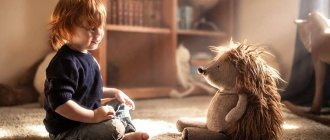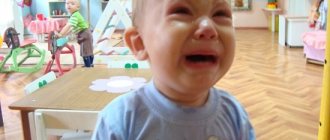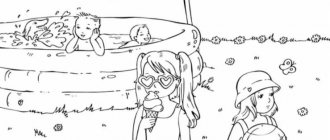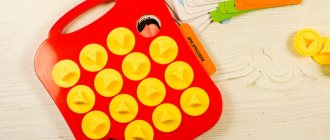“Professionals work in the kindergarten; they will teach him everything. We pay money, after all!” - this is how many parents argue, and then they are surprised that all the mothers and fathers of the group are up in arms against their child. The baby is uncontrollable, he bites and is rude, takes away toys and food, and the question arises about his mental state. But the reason may be less terrible and more banal: the child simply was not taught how to behave in a group. You can and should rely on educators, but you shouldn’t make a mistake yourself. It is important to instill good manners in your child from the first years of life and learn etiquette together. Then you won’t have to blush in front of kindergarten workers or other parents. To teach your child quickly, refer to this simple list of rules that apply in all kindergartens in Russia.
Communication with adults
Rules of behavior for children in kindergarten begin with the norms of proper communication. The child is afraid of new adults and is embarrassed, so it’s worth explaining to him how to behave with his uncles and aunts so that everything is fine:
- All employees must be called by their first name or patronymic or addressed as “You”. Make sure that your child learns the teacher’s first and last name. Addressing the form disciplines him. To do this, do not deviate from the rules and repeat the full name yourself, and not an abbreviation or nickname.
- When meeting, you need to say hello and, if necessary, ask permission. If you need to go out, find out something, complain about something, it is important to first clarify whether this can be done. Before you leave, you need to ask permission and say goodbye. These basic rules will help maintain the child’s safety and raise his social rating in the eyes of educators.
- You cannot interrupt an adult or raise your voice at him. The child must learn discipline, otherwise there will definitely be problems at school.
- If a child is hit, bitten, offended, or witnesses the escape (kidnapping, fainting, seizure) of another child, he must immediately complain to the teacher, but calmly and quietly state all the facts, without shouting or insulting the offenders.
- You cannot touch adults, much less beat them. It is important to maintain a boundary between yourself and the teacher.
It is important to learn that the teacher must be obeyed, because the child cannot yet be responsible for himself and his actions. He must follow orders and not react aggressively to criticism. If the child feels that the teacher treated him unfairly, he should tell his parents about the situation, they will sort it out. But you can’t take revenge yourself and become hysterical. You must remain calm in public places.
Conversation “Rules of behavior in kindergarten”
Topic: “These rules are important, we must follow them”
(Rules for safe behavior in kindergarten)
Tasks:
1) Expand and consolidate children’s knowledge about the rules of safe behavior in kindergarten.
2) To develop in children the ability to apply the learned rules of safe behavior.
3) Form in children the need to behave in accordance with safety rules.
4) Encourage children to share their knowledge with peers and the teacher.
Methods and techniques: Practical; Visual; Verbal: conversations, artistic expression; Surprise moment.
Materials and equipment: Doll Masha; Danger signs; Pencil (for experience); Medals and awards; Encyclopedia: “Rules of conduct for well-mannered children”
Progress of the lesson:
- Hello guys. Today you and I will not just have an activity: we will find dangerous places in the group and think about how we can avoid trouble. We’ll also try to remember the rules of behavior in kindergarten.
(child recites a poem about kindergarten)
Somebody's knocking on the door.
- Guys, I think someone came to us. Let's get a look.
(the Masha doll appears at the door)
-Hello Masha.
- (Masha) Hello. Please accept me into your group. I also want to play and study with the guys.
-Guys, let's take Masha into our group?
(Children's answers)
-Come on in, Masha, sit on the chair with the guys.
(Masha runs and hits the corner of the table and starts crying)
- Guys, it seems to me that Masha has already found one dangerous place in our group. Which one do you think?
(Children's answers)
-Well done guys, of course it’s a table. Guys, why did the table suddenly become dangerous? Does he bite? Scratched?
(Children's answers)
-Guys, the table will not be dangerous for us if you and I do not run in a group. It is so? Guys, let us all think together about what could become dangerous for us if we run around in a group. Let's find these places.
(Children one by one approach the teacher, take danger signs and mark dangerous places with them)
-Well, Masha, now do you understand why you hit yourself?
- (Masha) I understand, I won’t run in a group anymore.
- Well done, and now you can sit down with the guys.
(Masha approaches the chair and stands on it with her feet)
-What are you doing, Masha? You might fall again!
(The doll falls from the chair)
-Guys, let's take pity on Masha and explain to her what she did wrong again.
(Children's answers)
-Well done boys. Here we told you another rule of behavior in kindergarten: you cannot climb on high objects (chairs, tables, cabinets, window sills)
-Guys, which of you can name other rules of behavior in kindergarten?
(Children recite poems about rules of behavior)
-(Masha) Thank you guys, you taught me so much, but if you want, I’ll show you something. (Experience: a door and a pencil). Look, guys, what can happen if you stick your finger into a closing door.
(The hero approaches the door, holds a pencil in the opening and abruptly closes the door. The pencil breaks)
-Guys, what happened to the pencil?
(Children's answers)
- Yes, guys, the pencil broke, but in place of the pencil there could have been someone’s finger. Do you think it's very painful?
(Children's answers)
-Here’s another rule for us: you can’t play around with doors and stick your fingers in the door crack.
- Guys, are you tired? Let's play with you. (The game is “Do as I do”) Well done, guys! Now sit down on the chairs and we’ll play the game “What’s good and what’s bad.”
- Guys, you all did great today. We all remembered a lot of safety rules together. They explained to Masha how to behave in kindergarten so as not to get into trouble. Masha, do you remember everything?
-(Masha) Yes, guys, I remember all the rules and will definitely follow them. I also know how to walk up the stairs correctly. Do you know?
(Children's answers: don't run, don't push, hold on to the railing)
-Well done boys. Have you remembered all the rules?
(Children's answers)
- Guys, why do we need all these rules?
(Children's answers)
-Guys, I think that today you all deserved medals. I will now reward you all for the fact that you know well the rules of safe behavior in baby soda and helped teach Masha these rules
The rules of behavior in the cinema largely coincide with theater etiquette.
It just so happens that going to the cinema is considered a less formal event, which means the rules are not so strict.
Firstly, the appearance. You don’t have to go to the cinema completely dressed up; you can even wear jeans. Just don’t forget that clothes should be clean and tidy.
Secondly, you are allowed to take popcorn or candy with you into the cinema, but you should not eat too loudly or litter.
It is not customary to clap in movies, nor is it customary to laugh loudly and comment on what is happening. You can’t stop others from watching a movie with your comments and jokes.
And it’s not at all good to declare at the very beginning that you have already seen this film, and then tell in detail how it all ends.
At the cinema you:
1) don’t litter;
2) don't make noise;
3) do not behave provocatively;
4) do not comment on the film with the air of an expert;
5) and under no circumstances talk on the phone.
These are the basic rules. We hope that this information is useful to you.
And then you will often be invited to the cinema or theater, because it is better to go to any place in a pleasant company.
1. If you decide to go to the theater or cinema, but not alone, then what is the best way to invite a friend? This must be done in advance, several days in advance. After all, our friends may have other plans.
2. The couple needs to go to the seat at the theater or cinema. Who goes first? A man walks and leads to the place, facing those sitting.
3.What should you not do during a performance or watching a movie? Talk, rustle with papers or a program, fidget, eat, share impressions. Get up and leave during the show.
Ladder. Previously, it was customary for a man, when going up the stairs with a woman, to walk in front of her. At present, a slightly different order has been determined: it is advisable and therefore justified for a man to strive to get ahead of a lady only in cases where the stairs are dark, steep or shaky. If circumstances are different, the woman leads the way. When descending, the man goes first, followed by the woman. If someone politely gives way to you as they pass by, either bow slightly or say, “Thank you.” If you are on a narrow staircase and an elderly person, a boss or a lady is walking towards you, you need to pause and take a small step to the side, allowing the person coming to pass.
When a man and a woman walking in different directions collide on the stairs, the woman is not obliged to move away from the railing, even if this is contrary to the rule of “right-hand traffic”; the sides of the stairs with the railing are the privilege of the weaker sex, the elderly and children.
How to behave in the library
The library is a place that many people visit! And the rules of conduct here are quite strict.
Every library has a wardrobe. Leave your outerwear and all unnecessary things there. Take with you only what you need: a notepad, a pen, a library card. Do not leave valuables in the wardrobe! Take your mobile phone and money with you.
Keep silence in the reading room! After all, people don’t come to the library to socialize. You may even be asked to leave the premises if you start discussing a particular book loudly.
When you take the materials you need, find a free place and get ready to work.
Remember: keep the books in the condition in which they came into your hands! Do not bend the corners of the pages (better use a bookmark), do not drop books or place other objects on them. Under no circumstances should you tear out the pages or chapters you need! Use a photocopier if you don't want to carry tomes home.
How to behave at a disco
A disco is a place where people gather to dance. However, there are rules of behavior that must be followed there!
Make sure you have comfortable clothes. You will be dancing actively, so give preference to clothes that do not restrict movement.
The dances take place in a semi-dark room, so it will be great if your blouse or the inscription on it glows in the dark!
Don't stand on the sidelines during the disco. Dance, but don't push or step on your neighbors' feet. It’s unlikely that anyone will like it, respect others!
From time to time, go out of the room to get some air and wash yourself. This way you will feel better and can dance all night long!
1. Is it possible for a girl to dance with a girl, or a boy with a boy?
1. No
Communication with children
This is the most important point of the rules of conduct for children in kindergarten. If your baby does not behave as expected, you may have serious problems. Many parents react very violently to the slightest offense inflicted on their child. They can seriously spoil not only your mood. So teach your child caution, tolerance and common sense when interacting with children:
- You cannot beat, insult, or touch other children, even if they allow themselves to do so. In response to beatings and curses, you need to complain to your parents and teachers, and no longer communicate with the aggressor. It is better not to approach cruel children at all.
- You cannot boast about your financial situation and humiliate other children with hints about their poverty. The child himself has not yet earned anything, and in this sense all children are equal.
- You can’t spoil other people’s things and allow them to break your own. If other children break a toy, it is important to complain to parents and teachers in order to avoid a conflict.
- You cannot take other people's things for yourself, either secretly or openly. If you really want a toy, you need to ask your mother for it, and not take it from others. You cannot even accept a toy as a gift, as this may cause indignation among parents who bought this item for their child and do not intend to lose it.
- You cannot interrupt, shut up, or discuss other children behind their backs. A polite person will always listen to others and will not impose his opinion if they do not want to listen to him. It is also important not to occupy the airwaves with your person. Many children talk a lot and do not allow a word to get in, and therefore very soon they are left without listeners and worry, not understanding why this happened.
Any conflict situations are resolved by the teacher; he is an arbiter and judge.
Don’t be shy about complaining, because timely intervention will prevent a fight. If a child does something that is forbidden, imitating bad examples, this should also be reported to the teacher. Only he can call the parents and notify them about the problem that has arisen.
Parents themselves must set a good example. There is no need to sort things out with children who have done wrong. This is not your job, you have no right to scold and shame them. You can express your indignation in a calm manner to the teacher and parent if the problem is serious. But there is no need to throw a tantrum, especially in front of children. Fights and other antics will only worsen the situation and force you to look for another kindergarten. But you are neighbors, why should you quarrel?
Talking to children about behavior
Conversation with children on the topic “How well-mannered people act”
Goal: explain to children the rules of behavior in a team and the need to comply with them. Activate the appropriate vocabulary in speech.
Progress of the lesson.
The teacher tells the children:
“Mom with her son and daughter, your peers (can you imagine how old the children were?), got on the bus. There were no empty seats.
-Where do we sit? - the girl asked loudly.
- We will stand with you. “You are already big enough, and the playground is free, and no one will push you,” my mother noted.
Hearing this conversation, one of the passengers suggested: “Seat the children,” and made room for them. Mom didn’t even have time to say a word, but the guys had already sat down and, pleased with themselves, looked at their mother. She had a sad face.
- You are tired? Are you sick? - the son and daughter were alarmed.
- No, I didn’t get sick, but I was very, very upset. After all, now I have learned that my children cannot be called well-mannered people.
“Who did you find out from?” the daughter asked in bewilderment.
- I found out from you! - Mom explained and turned to the window.”
The teacher asks if the children liked the story. She clarifies from whom the mother learned that her children were not very well-mannered people, and how the children should have behaved so as not to upset their mother.
After listening to the children’s answers, the teacher summarizes them, then offers to repeat (in chorus and individually) the phrases with which it is customary to address a person when giving up his seat on public transport.
“Imagine,” the teacher continues the conversation, “that you and your grandmother got on the bus. And there is only one free seat on the bus. What should I do? And what do educated people do in this case?
And now you have made a transfer and are traveling by trolleybus. We saw two empty seats and sat down. And at this time a woman with a heavy bag stopped opposite. What will you do?
In conclusion, the teacher suggests making buses out of chairs and heading out of town, observing the necessary rules of behavior during the trip.
sundekor.ru
Table etiquette
During meals, the upbringing of a child is most evident. Cultured children eat carefully, do not criticize food, do not spit, or disturb others. Therefore, it is very important to leave all table games at home. Yes, and there they are inappropriate, to be honest.
- You should not talk with your mouth full, play with food or bite too large pieces (this is very dangerous). You could choke or stain your neighbor, furniture, and yourself.
- You cannot put your elbows on the table, swing on a chair, or swing your arms and legs during a meal. All games are after meals.
- Drinks should be drunk in small sips, main courses should be eaten with a fork, and soup with a spoon. This is obvious to you, but often the child makes mistakes even in such trifles.
- After eating, wipe your lips and hands with a napkin. After eating, you need to go to the toilet and rinse your mouth so that all food particles are removed.
- You can't talk bad about food and offend chefs. After eating, you need to thank and put away the dishes.
If a child doesn’t like the food, he should tell his parent about it after class, and not shout at the whole Ivanovskaya.
If he cannot eat at all, you need to tell the teacher that he cannot eat, otherwise he will feel bad. In such cases, the employee will not force him to eat food. In some children's institutions, children set the table themselves. In this case, you need to explain to the child that he cannot run, dance, or be distracted when he is carrying a plate. Otherwise, injury cannot be avoided, and all the contents will fall out onto the floor.
Etiquette in the toilet and bedroom
The most sensitive topics tend to raise the most questions and misunderstandings from kids. This is rarely discussed with them, and they have nowhere to get information from. Therefore, discuss with your child the rules of behavior in kindergarten that govern his trips to the toilet.
- Crowding around sinks and toilets is prohibited. If more than 6 children have already entered the room, you need to wait. If it’s completely unbearable to stand, you need to ask the teacher what to do? It will help you find a way out faster.
- You should always use toilet paper and flush after yourself. If there are any drops left on the seat, they should be wiped off and your hands should be washed immediately afterwards.
- After visiting the toilet, you should wash your hands with soap and dry them. This is a must, otherwise it’s easy to get sick.
- It is prohibited to splash water, climb onto radiators, or throw various objects into the toilet. You cannot draw on the walls or floor, even if you really want to.
- You cannot lock yourself in the toilet to play or deceive the teacher.
It is also important to remind your baby how to go to bed correctly. This ritual has its own recommendations.
- Before quiet time, children brush their teeth and go to the toilet for their needs.
- You cannot be capricious and argue with the teacher about the fact that you don’t want to sleep or are too lazy to brush your teeth. You need to listen to nannies and children's teachers.
- You cannot play or throw pillows in the bedroom. These activities disturb everyone and disrupt their routine.
- If you need to leave, it is important to do it slowly, carefully, calmly, so as not to wake up other children.
- Clothes must be folded in perfect order on the chair.
A daily sleep schedule is very important for children, because if it is not there, their evening activity will drive the parent crazy. Sleeping during the day calms the child and normalizes the state of his nervous system. So you need to teach your baby not to interfere with others, if he really does not want to end up in bed. We would like his problems!
Goal: to develop cultural behavior skills in children 4-5 years old
Tasks:
To form cultural behavior in children in a variety of life situations.
Develop children's communication skills with people around them.
To instill in children the moral qualities necessary in society.
Work with parents on issues of moral education of their family.
Teach children to independently choose a model of behavior depending on the situation.
Develop skills in using polite words and expressions in speech.
Materials:
Illustrations: Masha, images of a theater, cinema, shopping center, park, etc.
Prohibition signs: do not litter, do not make noise, do not touch, do not eat or drink, do not shout, do not put it in your mouth.
Signs: wash hands.
Today Masha came to us. Mishka told her that she absolutely does not know how to behave in public places. She wants to learn how to behave correctly, but, unfortunately, she does not know what public places are and how to behave. Let's help her!
Guys, what do you think public places are?
(Children's answers.)
— A public place is a place where different people can appear. For example, such a place could be your house where you live, an elevator, a street, a store, a cinema, a theater, a park, a playground, a bus.
Now you and I know what a public place is. How should you behave in these places? Prohibitory signs will help us with this, as well as illustrations that will tell us what to do and what not to do.
Let's play the game “This is me, this is me, this is my whole family.” If you can do this, then you say: “This is me, this is me, this is my whole family,” and if you can’t, then don’t say anything.
Look, Masha is going for a walk in the park. Let's help Masha figure out what not to do in the park? Choose those signs that indicate what you should not do, and please tell Masha (children’s answers).
You cannot shout, make noise, disturb other people, or litter.
In the park, Masha saw a playground and ran to the swing. Along the way, she pushed the boy, fell into the mud, got up and ran again. In dirty clothes and with dirty hands, Masha sat down on the swing. What did Masha do wrong?
(Children's answers.)
It’s bad that Masha pushed the boy. If she accidentally pushed him, then she should have asked for forgiveness. Our children are polite and friendly and don’t act like that. You also need to watch your step. Guys, what should you do if you fall and stain your clothes and hands? (Children's answers.)
Right. Hands need to be washed. And if there is no place to wash your hands, you can wipe it with a damp cloth. Shake off dirt from clothes. After all, along with dirt, bacteria enter the body and cause disease. This is what happened to Masha: her stomach hurt and her temperature rose. She got sick and had to go to the doctor and then take bitter pills.
And now we will play the game “Say the other way around.” I throw you a ball and say, “clean,” and you catch the ball and throw it back to me, saying, “dirty.” Healthy - sick, useful - harmful, polite - rude, hardworking - lazy, evil - kind, good - bad, fresh - spoiled, break - repair, angry - rejoice.
What is the name of the place where Masha had to go when she got sick?
That's right, a clinic. How should one behave there, since a clinic is also a public place? (Children's answers.)
You cannot run, shout, make noise, litter, eat, or touch the floor and walls.
And also, children, it is better to wear a mask in the clinic. What do you think the mask is for? (Children's answers.)
You need a mask to avoid infecting other people or getting sick yourself.
When Masha recovered, she was invited to visit, but she did not know how to behave. Masha came in, didn’t take off her shoes, immediately sat down at the table, noisily drinking juice. I saw a beautiful cup in the closet. She opened the closet and took it. Then she played with the cat, ran around the apartment and laughed loudly. When she was tired, she ran home. What did Masha do wrong? (Children's answers.)
That's right, guys. I should have said hello when I came to visit. Take off your shoes and wash your hands. You can't run or make noise. And when she left, she had to thank her for the invitation and say goodbye.
Another day Masha went to the theater and cinema. The theater was showing a play about animals.
Game “Imagine an animal”. One child portrays an animal, and the others guess.
Masha began to portray animals right in the theater. Children, can you do this? (No.) Please tell Masha how to behave. Masha liked the performance in the theater so much that she laughed and jumped for joy. Look at the signs and pictures.
Masha was watching a cartoon, and then she wanted to go to the toilet. Select the required signs.
On the way home, Masha went to the playground again. There she played with sand: cooked porridge, sang pies, built castles. After the game she felt hungry, and she went to the store to buy a pie and eat it on the street. Tell me guys, is it possible to eat on the street? (No, why?
Masha had dirty hands. Dirt from your hands will get onto the pie, and, therefore, into the stomach. And you and I already know that bacteria are bad. They can make you sick. Masha did not get sick this time, because the saleswoman in the store did not sell Masha either a pie or juice until Masha came with clean hands and clean clothes. Please tell Masha how to behave in the store. Is it possible to run and scream? What is allowed?
Thank you guys for helping Masha. Now she will behave correctly in public places.
Behavior on site
Going outside for preschoolers is fraught with many dangers. Outside the kindergarten, a child can get seriously injured or even get lost if he does not know the rules of behavior in kindergarten and during walks. Teach the tomboy to obey his elders and follow all the recommendations of common sense, which the little one has not yet developed.
- You need to go out onto the playground or into the street in pairs and formations, as the teacher said. On the way back, you need to make sure that your date is in place and that everything is okay with her.
- You cannot leave the playground without the accompaniment or consent of a teacher. Any attempts by strangers to talk to adults, give something, or take them outside the fence must be stopped. You need to immediately run to the teacher and tell him everything. Under no circumstances should you take candy and toys, talk, or leave with strangers.
- It is forbidden to run in front of swings and carousels, they can injure the child.
- Before starting a group game, you need to listen to the rules of conduct and follow them.
- You can’t run or jump too actively, otherwise you might hurt others.
Parents must also follow the rules of the game: do not pick up the child until you have agreed with the teacher.
And if you are delayed or have changed the choice of escort to your home, please inform us in advance. Even if a conflict situation arises in kindergarten, do not lose your temper in front of the children and do not force your son or daughter to blush for you. It is important to explain everything calmly. And, of course, only for adults. Do not contact other children, and certainly do not scold them.
Cultured people always come from cultured families. Whatever the kindergarten, it is the parents who are the main authorities for the child, they are the ones who bear the main responsibility for his upbringing. Don't set a bad example, and your baby will learn only good things.
The influence of various factors on adaptation
How long it will take a child to get used to a child care facility is influenced by many factors. Let's look at the main ones.
Child's age
The situation is such that many mothers strive to send their children to kindergarten as soon as possible and go back to work after maternity leave. Therefore, recently the need for nurseries has increased, starting to accept children from one and a half years old, which not every preschool institution has.
Most experts believe that the younger the child, the more difficult his adaptation period is, since the immune system has not yet strengthened and the need for parental care and attention has increased.
Therefore, the optimal age for starting kindergarten life is considered to be 2.5 - 3 years. And pediatricians insist that parents send their children to kindergarten no earlier than three years of age.
Read detailed material with expert opinions on this topic – Is it time to go to kindergarten? When is the best time to give up a child and what does a parent need to know?
Health status
As we have already said, children with limited health capabilities or private colds and chronic diseases have a hard time getting used to kindergarten.
Therefore, parents should postpone kindergarten and wait until the child’s body can adapt to preschool without serious consequences.
Level of development of skills and abilities
By the beginning of kindergarten life, children should have all the necessary skills and abilities: go to the potty, hold a spoon, drink from a cup, partially dress and undress themselves, and also be able to ask an adult for help.
If parents are used to doing everything for the child, it will be difficult for him to get used to independence. Accordingly, his adaptation period may be prolonged.
Level of socialization
In kindergarten, the child will have contact with a large number of children and adults. It’s good if he already has such communication experience. Otherwise, it will be very difficult for a child who is accustomed to seeing only his mother and father next to him to get used to the children's team and teachers.
How to get your child to talk if you suspect that he is being bullied or beaten in kindergarten?
Also, the duration of adaptation depends on the personality of the teacher to whom the child is assigned, the number of children in the group, the characteristics of the child’s nervous system and the atmosphere in the family.









